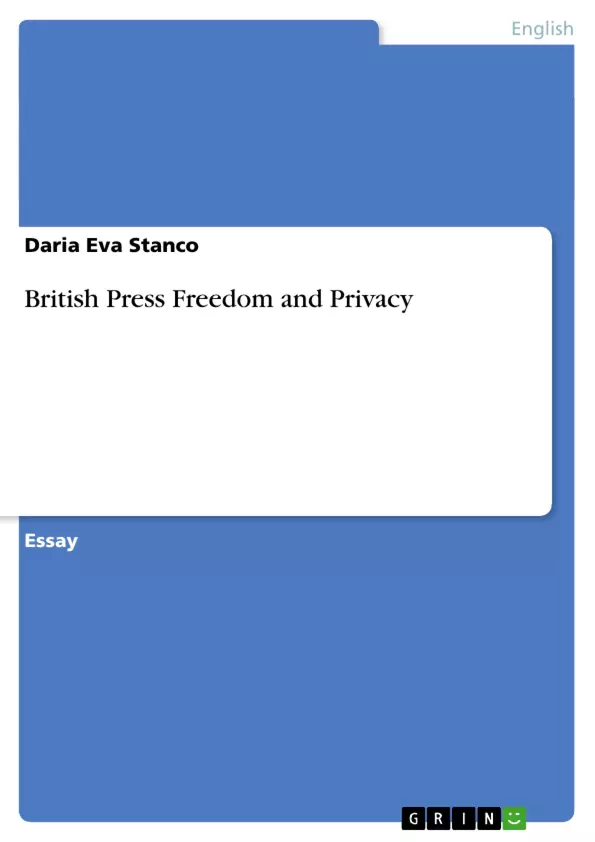Without doubt, freedom of the press is an important cornerstone of democratic societies. It is widely considered that the more press freedom there exists in a country the more democratic, developed, etc. this country is. Every year, the international organization “Reporters Without Borders” provide a record of the current situation of press freedom all over the world - awarding 1st place the country which has most of it. After the death of Diana, Princess of Wales, however, the freedom of the press is looked at more critically than ever before. Diana’s complaints to the Press Complaints Commission as well as an obtained injunction against a press photographer both display her urging need for more privacy in the years before her death. She made several statements claiming more comfortability in her and her children’s private life. But not until her tragic death in 1997, new measures in order to protect the privacy of individuals were seriously taken into consideration.
In this essay, these attempts to restrict the freedom of press are investigated. First of all, a rough definition of crucial terms like privacy and press freedom will be given. Secondly, the history of the British press and its freedom will be outlined in chapter II. In chapter III, important measures taken after 1997 will be explained. Taking into account several articles about privacy law, the current situation will be sketched as well. Finally, my own opinion and ideas will be exposed in the conclusion.
Inhaltsverzeichnis (Table of Contents)
- Introduction
- British press freedom and privacy
- Measures to protect privacy against press intrusion
- Conclusion
Zielsetzung und Themenschwerpunkte (Objectives and Key Themes)
This essay examines the tension between press freedom and privacy in the United Kingdom, particularly in the context of press intrusion. It traces the historical development of British press freedom and explores various attempts to restrict press freedom in order to protect privacy.
- Defining privacy and press freedom
- Historical development of British press freedom
- Measures taken to protect privacy after 1997
- Self-regulation of the British press
- Impact of the Official Secrets Act and libel laws on press freedom
Zusammenfassung der Kapitel (Chapter Summaries)
- Introduction: This chapter introduces the topic of press freedom and privacy, highlighting the importance of both concepts in a democratic society. It also discusses the controversy surrounding press intrusion in the wake of Diana, Princess of Wales' death.
- British press freedom and privacy: This chapter delves into the definitions of privacy and press freedom, outlining their historical evolution in the United Kingdom. It explores the development of press freedom from the abolition of censorship laws in 1695 to the rise of a politically independent press in the 19th century.
- Measures to protect privacy against press intrusion: This chapter discusses various measures implemented in the UK after 1997 to restrict press freedom and protect privacy. It focuses on the role of the Press Complaints Commission (PCC) and the Code of Practice in regulating the press.
Schlüsselwörter (Keywords)
The main keywords and focus topics of this text include: press freedom, privacy, British press, Press Complaints Commission (PCC), Code of Practice, Official Secrets Act, libel laws, self-regulation, intrusion, and democratic societies.
Frequently Asked Questions
How is press freedom defined in the UK?
Press freedom is considered a cornerstone of democracy, allowing media to report without government censorship, though it is balanced against privacy rights.
What was the impact of Princess Diana's death on press regulation?
Her tragic death in 1997 led to a critical look at press intrusion and the implementation of stricter measures to protect individual privacy.
What is the Press Complaints Commission (PCC)?
The PCC was a self-regulatory body in the UK that handled complaints regarding the editorial content of newspapers and magazines based on a Code of Practice.
How do libel laws affect British press freedom?
Libel laws can act as a restriction on press freedom by allowing individuals to sue for damages if published information is considered defamatory and untrue.
What is the Official Secrets Act?
It is a law that protects state secrets and national security, which can sometimes limit the press's ability to report on government activities.
- Citation du texte
- Daria Eva Stanco (Auteur), 2006, British Press Freedom and Privacy, Munich, GRIN Verlag, https://www.grin.com/document/88422



